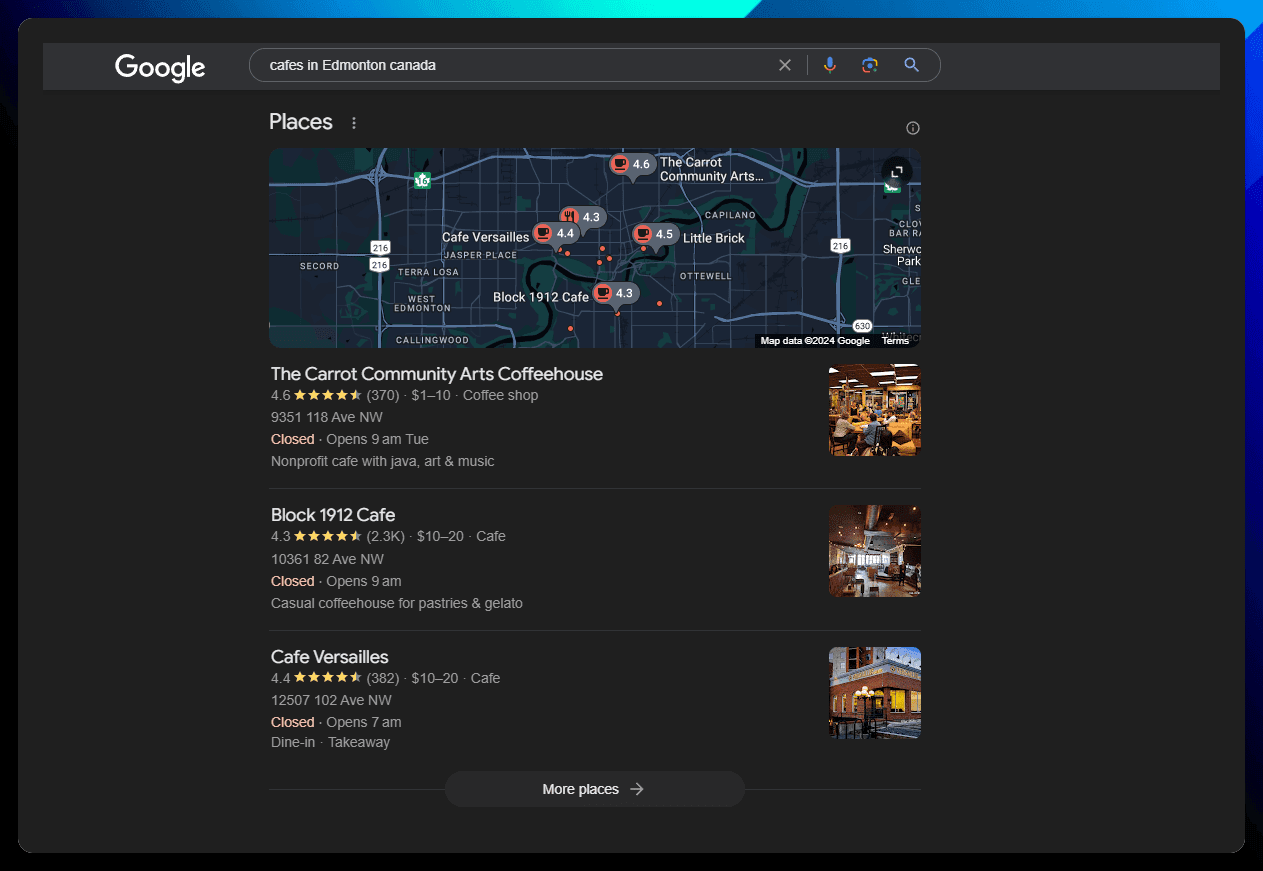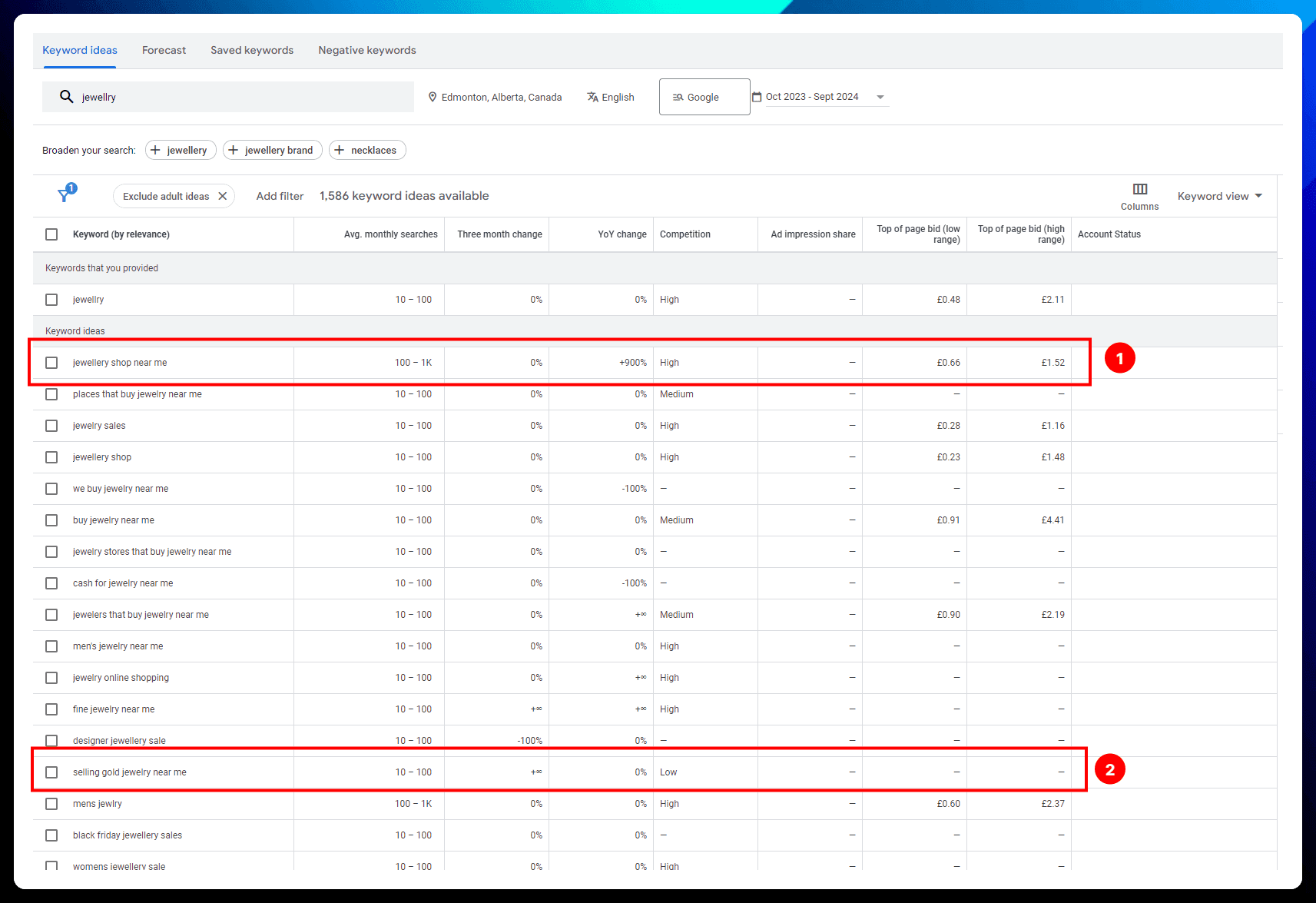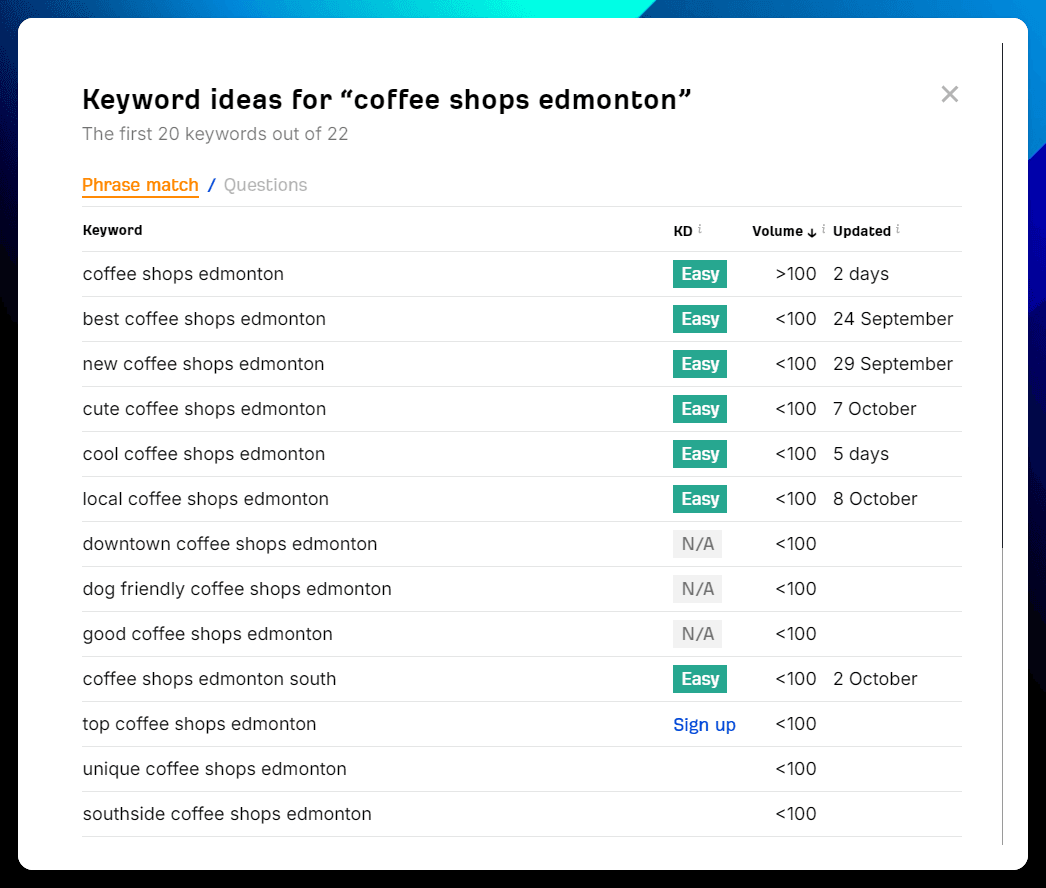Edmonton SEO on a Budget: Tips & Tricks for Small Businesses
by Aaron Janes, Founder
If your a business owner, and you want to learn the same strategies that I use to grow my business and my clients, then sign up for my newsletter.

Running a small business in Edmonton is no walk in the park, and trying to maximize the results of your SEO on a budget doesn't exactly make things easier.
Sure, investing a ton of resources into your SEO would be great (or being able to just outsource everything to a big digital marketing agency), but between managing inventory, keeping customers happy, and staying ahead of the competition, you probably feel thinly spread as it is.
But here's the good news: you don't need a massive marketing budget to conquer the Edmonton market. You absolutely can boost your online visibility and attract more customers without emptying your wallet.
In this guide, I'm taking you past the fancy jargon and expensive strategies and diving into practical, budget-friendly SEO tips and tricks tailored explicitly for Edmonton's small businesses.
Let's go.
Why Your Small Business in Edmonton Needs SEO
I understand.
You're passionate about your handcrafted jewelry, your killer coffee blends, or your top-notch dog grooming services. But passion alone won't bring customers to your door (or your website!). There's a technical approach required to become visible online, and that's where SEO comes in.
But conducting your own SEO for small businesses on a fundamental level is not really enough. You're not just facing stiff competition from other small businesses but also competing against the big corporations.
If you're running a small coworking cafe space, it's not just about outranking other coffee shops but also Starbucks and Tim Hortons.
Good SEO allows you to level the playing field.
It's about making sure your business shows up when Edmontonians search for things like "handmade jewelry Edmonton," "best coffee shops in Whyte Ave," or "dog groomers near me in Sherwood Park." And in the feeds of the people who actually want or need to use your services.
Think of it this way:
- Targeted reach: Search engine optimization helps you connect with people actively searching for what you offer, right here in Edmonton. These people are already interested in your products or services, making them much more likely to become customers.
- Brand building: When you consistently appear in search results, you build credibility and trust with your target audience. People start to recognize your brand and see you as a go-to expert in your field. The more often people see you, the more your reputation builds and the more successful you can become.
- Long-term growth: Unlike paid advertising, which stops working when you stop paying, SEO builds long-term value. The effort you put in today can continue to drive organic traffic and customers for months and even years to come.
SEO helps your small business stand out in the crowded Edmonton market, attract the right customers, and achieve sustainable growth.
And the best part? Many effective SEO strategies can be implemented without spending a dime.
Your Free SEO Starter Kit: Essential Tools from Google

Before we dive into specific strategies, let's make sure you have the right tools for the job. Luckily, some of the most powerful SEO tools are completely free, courtesy of our friends at Google. Think of these as your SEO starter kit:
Google Business Profile (formerly GMB)
Your Google Business Profile is the bread and butter of your local SEO efforts. It's free to set up and a must if you want to appear at the top of the rankings.
It's your direct line to appearing in Google Maps results, local search results, and even the coveted "knowledge panel" that shows up alongside search results.
If you want to show up in the results here, you'll need a GBP set up for success.

Google Search Console
Think of Google Search Console as your website's report card, giving you valuable insights into how Google sees your site. It can help you:
- Understand your search performance: See which keywords people are using to find your site and how you're ranking for those keywords.
- Identify technical issues: Get alerts about any problems affecting your website's visibility, such as broken links, slow loading times, or mobile-friendliness issues.
- Submit your sitemap: Help Google understand the structure of your website and index your pages more effectively.
Google Analytics
Want to know who's visiting your website, where they're coming from, and what they're doing on your site? Google Analytics is your detective, providing a wealth of data about your website traffic and user behaviour. You can track:
- Traffic sources: See how people find your website (search engines, social media, referrals, etc.).
- User demographics: Learn about your audience's age, location, interests, and more.
- Page views and bounce rate: Understand which pages are most popular and identify areas for improvement.
- Conversions: Track how many visitors are taking desired actions, such as purchasing, filling out a form, or signing up for your newsletter.
Sign up for these tools now, connect your website, and get the data coming in as soon as possible. These not only help you manage your website's Google presence but will provide the necessary information and data to make informed decisions moving forward.
On-Page Optimization: Taking Charge of Your Website's SEO

With your toolkit set up, it's time to get to work on your website, starting with the website itself.
In digital marketing, optimizing your website's SEO is known as "on-page optimization." Basically, the art of making sure every aspect of your website is as optimized as possible for both search engines and visitors.
Keyword Research
Keywords are the words and phrases people use when searching online, and a key part of search engine optimization.
Your job is to figure out what your ideal customers in Edmonton are typing into Google. You can then include these terms and phrases into your content, which Google then reads, indexes, and when people search those terms, your website is put front and center.
The best, easiest, and most affordable way to do this is to sign up for the Google Keyword Planner (or use the free version of Ahrefs Keyword Tool, Moz, or a similar tool) and start searching.
Start searching for basic terms related to your business and see what keywords are getting a lot of searches and have low competition. It's all well and good going for high-competition keywords with lots of volumes, but if you're a small business starting out, the chances are you don't have a chance to rank number one, so it's better not to waste your time.

- This keyword has a high-search volume, but high competition, meaning new websites with a low authority will find it hard to compete and get into the top ten results.
- This keyword has a somewhat okay search volume of up to 100 searches per month, but low competition, meaning it's a great keyword to get started with building the reputation for your website.
For now, start small with the small fish, build up your reputation, and then you can tackle the large keywords down the line. Start with what's manageable and profitable for now.
The trick here is to think local and think specific.
Don't just target broad keywords like "restaurants." Instead, focus on "best brunch spots in Edmonton" or "vegan restaurants near Whyte Ave." These "long-tail keywords" are more specific and have less competition, giving you a better chance of ranking higher.

Content Optimization
Content is king, queen, and the entire royal court of SEO. But it's not just about stuffing keywords into every sentence (yuck!). It's about creating valuable, informative, and engaging content your audience will love.
And by content, I'm talking about the copy on your website pages, your blog posts, your product pages, and basically anywhere else you have written word representing your business.
Here are some considerations when it comes to content:
- Answer your customer's questions: What are your customers curious about? What problems are they trying to solve? Create content providing answers and solutions.
- Write for humans, optimize for robots: Use keywords naturally throughout your website copy, but prioritize clear, concise, and engaging writing.
- Don't forget the basics:
- Title tags: HTML tags are like headlines for your web pages. Make them catchy and informative, and include relevant keywords.
- Meta descriptions: These are the short snippets that appear under your title tag in search results. Write compelling descriptions that encourage people to click.
Technical SEO
Technical SEO might sound intimidating, but it's about ensuring your website functions smoothly and is easily accessible to search engines.
If you're going to invest in any part of the process via SEO services, this is probably the option to go for because it takes a bit of skill and experience to know what you're doing and how to get it right, although there are plenty of free resources online.
- Mobile-first is a must: Most people in Edmonton search on their phones. Ensure your website is responsive and looks great on all devices. Google's Pagespeed Insights can help you check.
- Speed matters: No one likes a slow website. Optimize your images, use caching plugins, and choose a reliable web host to improve your loading times.
- Navigation is key: Make sure your website is easy to navigate, with a clear hierarchy and logical structure. This helps both users and search engines find what they're looking for.
When it comes to navigation, I'm talking about having a website URL like www.yourwebsite.com/blog/exact-keyword, rather than www.yourwebsite.com/blogpage/5-things-you-need-know-12rjefdocx.
By tackling these on-page optimization elements, you'll be well on your way to creating a website that ranks well in search results and attracts more customers.
Off-Page Optimization: Building Your Online Reputation (Without Spending a Fortune)

If on-page optimization is about sprucing up your website, off-page optimization is like spreading the word about your awesome business throughout Edmonton and this area of the virtual world.
It's about building credibility and authority so that Google (and your customers!) see you as a trustworthy source.
Now, some off-page strategies can get pricey (think hiring a PR firm, SEO services, or launching a massive link-building campaign). But fear not, there are plenty of ways to boost your off-page SEO without breaking the bank:
Local Citations: Put Yourself on the Map (Literally!)
Remember how important your Google Business Profile is?
Well, think of local citations as reinforcing that presence. It's about getting your business listed on relevant online directories and platforms.
- Free directories are your friend: Yelp, 411.ca, Yellow Pages, and industry-specific directories are great places to start. Many offer free listings, allowing you to put your business information (name, address, phone number, website) in front of potential customers.
- Consistency is key: Make sure your NAP (name, address, phone number) is consistent across all listings. Inconsistent information can confuse search engines and hurt your rankings.
Community Engagement: Become an Edmonton Insider
Building relationships online is just as important as networking in person. This not only increases the traffic you're getting from other sources but will help boost search engine rankings across the board.
- Join the conversation: Engage with local online communities, forums, and social media groups relevant to your industry or target audience. Share your expertise, answer questions, and be a helpful contributor.
- Support local initiatives: Participate in online discussions about local events, charities, or community projects. This shows your commitment to the Edmonton community and helps you build relationships with other local businesses.
Content Marketing: Share Your Story, Attract Backlinks
We've already talked about creating awesome content for your website. Now, let's use that content to attract backlinks – those valuable links from other websites that signal to Google that your site is trustworthy.
- Create shareable content: Infographics, blog posts with local insights, or even videos showcasing your business can attract attention and encourage other websites to link to you.
- Guest blogging: Offer to write guest posts for relevant local websites or industry publications. This exposes your business to a new audience and allows you to earn a valuable backlink.
- Social media: Share your content on social media platforms and engage with your followers. While social media signals might not directly impact rankings, they can drive traffic to your website and increase your brand visibility, indirectly boosting your SEO.
By implementing these budget-friendly off-page strategies, you can build a strong online reputation, attract valuable backlinks, and improve your search engine rankings, without the need of an expensive Edmonton SEO company.
Tracking Your Budget SEO Success (on a Budget, of course!)

You've put in the work, optimized your website, built some local citations, and maybe even started engaging with the Edmonton community online. But how do you know if all this effort is actually paying off?
While there are a ton of tools out there that can help track your progress and provide actionable feedback on what to do next, you can use the free alternatives we covered earlier to do it for free (minus the time investment).
Google Analytics
Google Analytics is like your website's personal detective, providing a wealth of information about your visitors and their behaviour. Here are some key things to track:
- Organic traffic: Is your website traffic increasing from search engines? This is a good indicator that your SEO efforts are working.
- User engagement: Are visitors spending time on your site, exploring multiple pages, and engaging with your content? This shows that your website is providing value and keeping people interested.
- Bounce rate: A high bounce rate (people leaving your site after viewing only one page) could signal that your website isn't meeting their needs or expectations.
- Conversions: Are visitors taking desired actions, like making a purchase, filling out a contact form, or signing up for your newsletter? Track your conversion rates to see how effectively your SEO is driving results.
Google Search Console: Your Search Performance Monitor
Google Search Console provides valuable insights into how your website is performing in terms of search results. Pay attention to:
- Keyword rankings: Are you ranking higher for relevant local keywords? Search Console shows you which keywords drive traffic to your site and where you stand in search results.
- Click-through rate (CTR): How often are people clicking on your website in search results? A high CTR indicates that your title tags and meta descriptions are compelling.
- Indexing issues: Search Console can alert you to any problems preventing Google from indexing your website correctly, such as broken links or crawl errors.
By regularly monitoring these metrics in Google Analytics and Search Console, you can gain a clear understanding of your search engine optimization progress, identify areas for improvement, and make data-driven decisions to optimize your strategy.